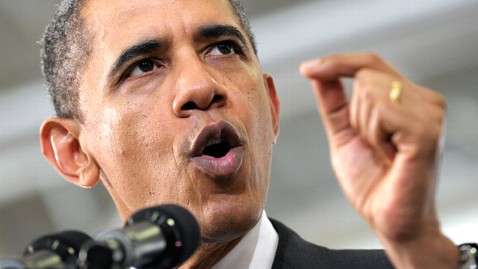Obama Budget Doubles Down on Populist Proposals

(Credit: Susan Walsh/AP Photo)
President Obama today doubled down on the populist proposals central to his re-election campaign with a $3.7 trillion budget that outlines his tax and spending priorities for 2013.
"In the State of the Union, I outlined a blueprint for an economy that is built to last, an economy built on new manufacturing and new sources of energy and new skills and education for the American people. Today we're releasing the details of that blueprint in the form of next year's budget," Obama said in a speech at a community college in northern Virginia.
"And, don't worry, I will not read it to you. It's long and a lot of numbers," he added, drawing laughs from the crowd.
The Obama budget calls for $1.3 trillion in spending on the nation's credit card next year, including $350 billion in spending on jobs programs and $476 billion in infrastructure projects. Obama also wants to boost aid for manufacturing research and development by 19 percent above current levels, to $2.2 billion.
To pay for the spending, the president would raise $1.5 trillion in added tax revenue over 10 years, mainly from higher taxes on wealthier Americans. He would allow the Bush tax cuts to expire on families earning more than $250,000 a year and impose a new minimum tax of 30 percent on millionaires, which the administration has called the "Buffett Rule."
But with no chance that Congress will enact the agenda in an election year - and many of the included proposals already rejected - the presentation today was largely a moment of political theater aimed at projecting an image of the president as a "warrior for the middle class."
"You know, the budget that we're releasing today is a reflection of shared responsibility," Obama said, repeating a refrain he has used on the campaign trail. "It says that if we're serious about investing in our future and investing in community colleges and investing in new energy technology and investing in basic research, well, we've got to pay for it, and that means we've got to make some choices."
The president is seeking $360 billion in cuts to Medicare and Medicaid and $278 billion in savings from non-health benefits programs such as agriculture subsidies and federal civilian worker pension; cuts he said he "wouldn't normally make if they weren't absolutely necessary."
"But they are," Obama said, "and the truth is we're going to have to make some tough choices in order to put this country back on a more sustainable fiscal path."
The administration says the budget would reduce the deficit $4 trillion by 2022 through a spate of tax increases, war savings and spending cuts previously agreed to with Congress.
Republicans have disputed the deficit-reduction numbers, which, they say, reflect gimmickry, and have blasted the budget document as a reflection of a broken promise and overt attempt to woo voters.
"His budget for next year is more of the same," Republican National Committee Chairman Reince Priebus said. "It's full of more spending and more tax increases that have put this country deeper into debt. Instead of mortgaging our children's future, President Obama should have fulfilled his promise to cut spending."
Senate Minority Leader Mitch McConnell of Kentucky called the budget a "campaign document."
"This proposal isn't really a budget at all," he said. "This was a real opportunity for the president to get serious about the fiscal situation we face in the Obama economy, but once again, the president is shirking his responsibility to lead and using this budget to divide."
Republicans also note that despite the cuts has heralded, the president's budget would mark the fourth straight year that deficit spending exceeds $1 trillion, falling well short of his 2009 promise to "cut the deficit we inherited by half by the end of my first term in office."
White House chief of staff Jack Lew has denied Obama broke his promise, insisting Sunday that the economic crisis demanded emergency spending in the form of the Recovery Act.
"It cost money in terms of lost revenue and slower economic growth. We're on track now," Lew said. "We've seen several months of sustained economic growth and job creation, but we're not out of the woods yet."